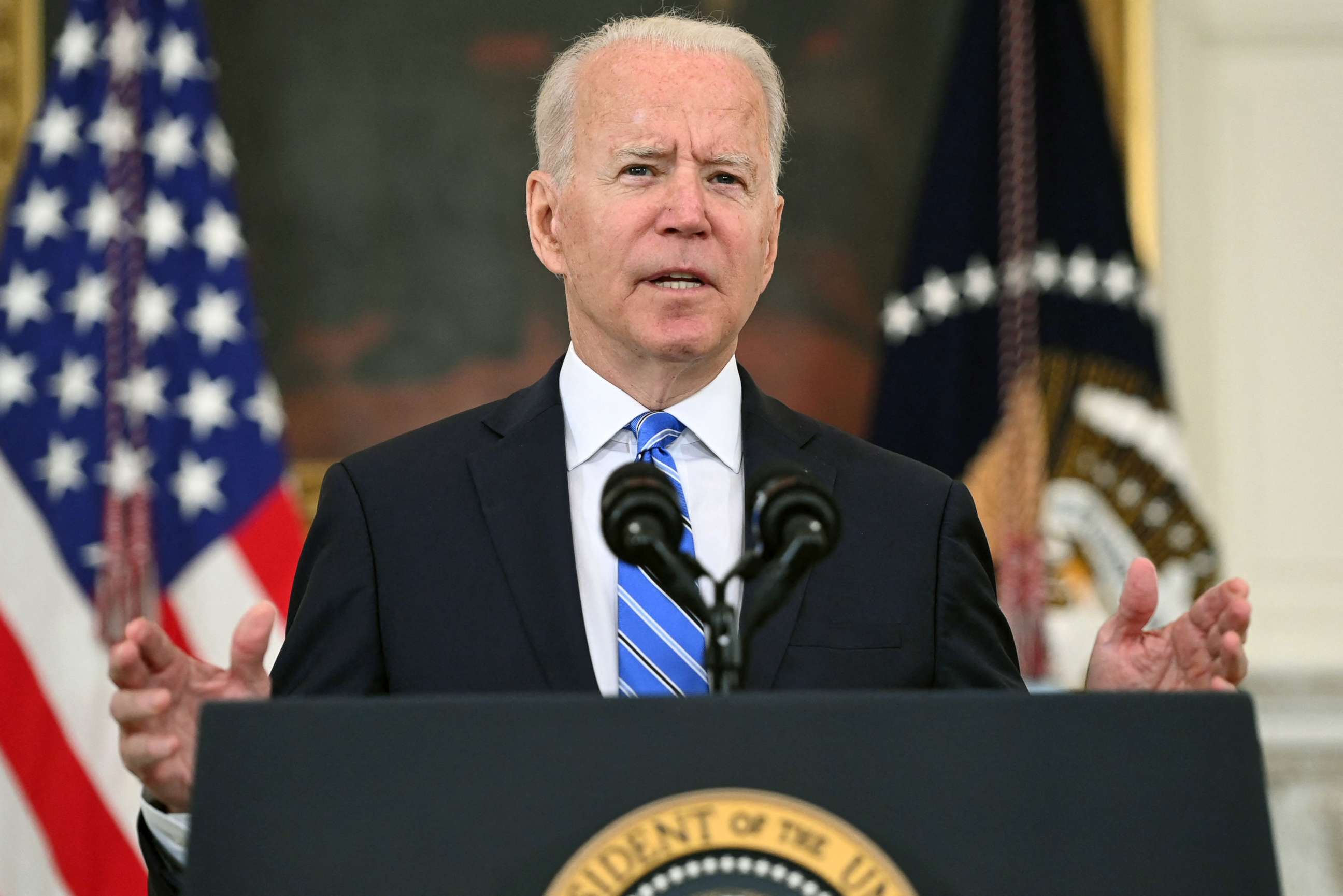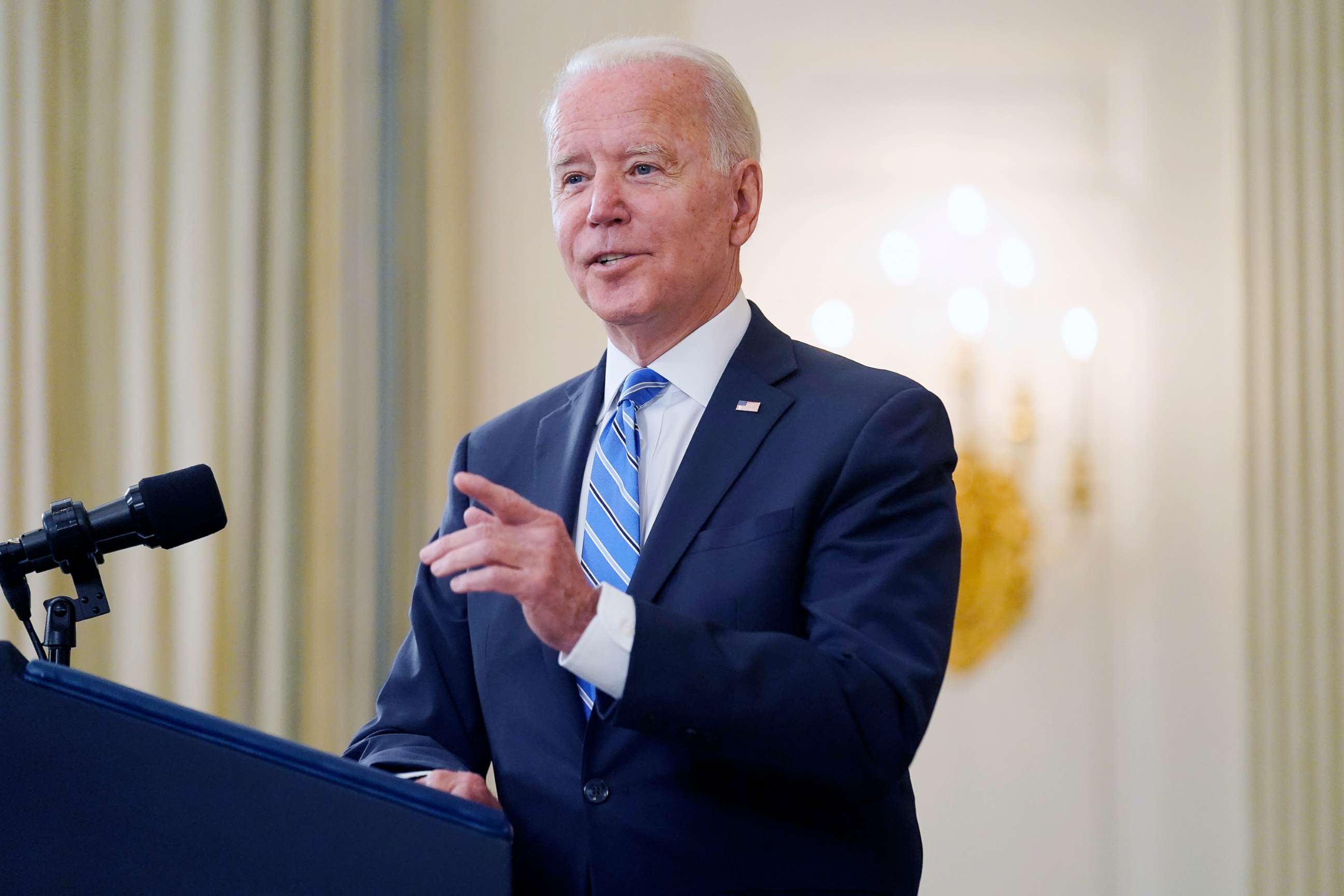Biden pushes back on inflation fears ahead of infrastructure plan vote
He said those worried should be "enthusiastic" about his big spending package.
With financial markets down sharply Monday over whether the new delta variant would endanger the recovery, President Joe Biden on Monday pushed back on inflation fears also giving investors jitters, insisting that his policies will create a strong economy and that higher prices are only a short-term growing pain.
"There's nobody suggesting there's unchecked inflation on the way, no serious economist. That's totally different -- I mean, look, the stock market is higher than it has been in all of history, even when it was down this month. Even down this month," Biden said in White House remarks touting the recovery six months into office.
Biden also took a moment to hit former President Donald Trump for his focus on the stock market, noting there are other ways to judge economic health.
"Now, I don't look at a stock market as a means by which to judge the economy like my predecessor did. But he'd be very, he’d be talking to you every day for the last five months about how the stock market is so high. Higher than any time in history. Still higher than any time in history. So, that's not how I judge whether or not we're having economic growth," Biden said.

While pushing his infrastructure policies to lawmakers, he also made the case that inflation is merely temporary, a result of lingering supply chain challenges and an uneven restart after an unprecedented economic upheaval.
"Reality is you can't flip the global economic light back on and not expect this to happen," Biden said.
Biden noted that 60% of price increases, according to some economists, are due to global supply chain challenges, such as the shortage of semiconductors that has spurred a spike in car prices, and the increase in lumber prices. Calling price increases temporary, Biden worked to assure Americans he won’t let inflation get out of control.
“I want to be clear. My administration understands if we were to experience unchecked inflation over the long-term, that would pose a real challenge to our economy. So while we're confident that isn't what we're seeing today, we're going to remain vigilant about any response as needed,” he said.
Biden also noted that he has assured Federal Reserve Chairman Jerome Powell that he is committed to the independence of the Fed, and encourages Powell to take whatever steps necessary to keep the economy strong.
Biden then turned to the elephant in the room -- the $4 trillion+ in additional government spending he’s pursuing.
“If we increase the availability of quality, affordable child care, elder care, paid leave, more people will enter the workforce. These steps will enhance our productivity, raising wages without raising prices. That won't increase inflation. That will take the pressure off of inflation,” Biden said, referring to the $3.5 trillion “human infrastructure” plan Democrats on Capitol Hill are seeking to pass without any bipartisan support through special Senate budget rules.
“If your primary concern right now is inflation, you should be even enthusiastic about this plan,” Biden added.
“What we can't do, is go back to the same old trickle-down theories, that gave us nearly two trillion dollars in deficit finance corporate tax giveaways, that did nothing to make our economy more productive or resilient,” Biden warned. “We can't go back to the old failed thinking.“
With a key procedural vote this week in the Senate on the bipartisan infrastructure framework, Biden reminded lawmakers they already had a deal.
"Whatever different views some might have on current price increases, we should be united in one thing: Passage of the bipartisan infrastructure framework which we shook hands on. We shook hands on," Biden said.

Despite attempting to sell his spending packages, Biden did not address the fact that so many questions about the packages remained unanswered ahead of Wednesday deadlines set by Senate Majority Leader Chuck Schumer: a key procedural vote on a bipartisan $1.2 trillion traditional infrastructure spending bill, and a self-imposed deadline for members of his own party to reach agreement on a $3.5 trillion spending package, which covers the majority of Biden's American Families Plan agenda, including childcare, free community college, and provisions to lower health care costs.
Top Republican negotiator Sen. Rob Portman expressed frustration Sunday with the state of the talks.
"We shouldn't have an arbitrary deadline of Wednesday. We should bring the legislation forward when it's ready… it's got to be done in a thoughtful, bipartisan way. We don't want to rush this process or make mistakes," Portman said in an appearance on CNN's "State of the Union."
One remaining hurdle is how to pay for all the spending, after Democrats agreed to drop IRS tax enforcement provisions that were estimated to net $100 billion over ten years in the face of Republican pushback. President Biden has called for both spending bills to be fully paid for, mostly through tax increases on the wealthy and corporations.
"How do we vote on something which is not yet written as we try and get it right?" Senator Bill Cassidy, R.-La., asked in a "Fox News Sunday" interview. "We can get it done, but if they refused to cooperate on the pay-fors, it's not going to pass. They know that."




